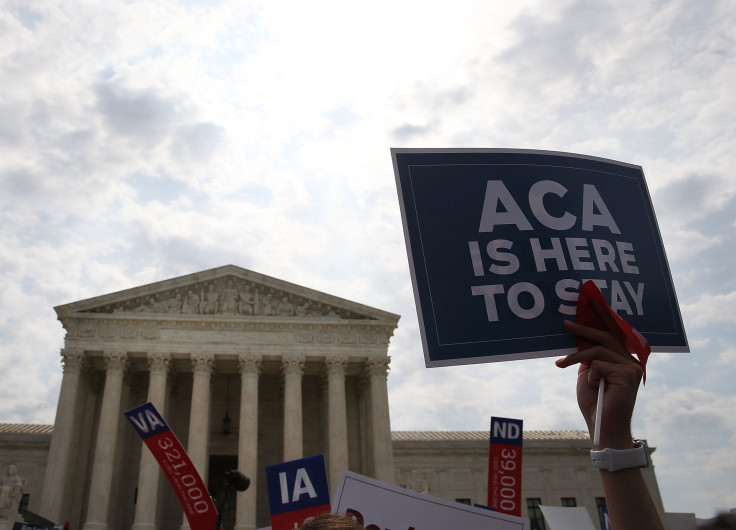Supreme Court Upholds Health Care Subsidies In King Vs. Burwell In 6-3 Ruling Favoring Obamacare

Subsidies to offset the cost of health insurance will remain legal for residents of the 34 states that use a federal exchange to sell the health insurance plans, the Supreme Court ruled by a vote of 6-3 Thursday in King v. Burwell, the latest major challenge to the Affordable Care Act. The decision handed a victory to the Obama administration and its landmark healthcare legislation, and it saves health insurance for the 8.2 million people relying on subsidies to help them pay for such coverage.
Chief Justice John G. Roberts wrote for the majority, which included Justices Anthony Kennedy, Ruth Bader Ginsburg, Stephen Breyer, Sonia Sotomayor and Elena Kagan, according to ScotusBlog. Justice Antonin Scalia wrote the dissent.
Federal subsidies to offset the cost of insurance constitute one of the pillars of the Affordable Care Act, which established marketplaces through which people could buy health insurance. States could either set up their own exchanges, which are also known as marketplaces, or they could rely on the federal government’s HealthCare.gov. Thirty-four states opted for the latter.
For people who buy their health insurance on these Obamacare exchanges, those with qualifying incomes were eligible to receive government subsidies, in the form of tax credits, to reduce the cost of monthly premiums. But to some, such assistance was an unwelcome imposition.
David King, a 64-year-old Virginia resident, was the lead plaintiff in the case. King protested the requirement that he purchase health insurance that, thanks to government subsidies, were made affordable to him. A limo driver who made $39,000 a year, King could pay $275 a month for health insurance actually worth $648 a month, with federal subsidies covering the difference, according to a Supreme Court blog post.
If it weren’t for those subsidies, King would have qualified for a hardship exemption excusing him from having to buy insurance in the first place. He and the three other plaintiffs listed in King v. Burwell – along with, notably, the conservatives who proudly proclaimed to have designed the argument on which the case was based – claimed that because the Affordable Care Act said that subsidies were designated for people buying health insurance on exchanges “established by the State,” as the law is written, King literally wasn't eligible for these subsidies, because Virginians use HealthCare.gov, the federal site.
That phrase and the question of which states can distribute federal subsidies to their residents were at the heart of the case. King’s name was listed on the lawsuit, but the idea of dismantling Obamacare by focusing on those four words originated with a group of conservatives.
“We were the first ones to lay it all out,” Jonathan Adler, a law professor, told the New York Times in March. As far back as 2010, when Obama signed the Affordable Care Act into law, conservatives had been testing and searching for possible weaknesses in the law. It was a lawyer from Greenville, South Carolina, who caught the phrase that became the heart of King v. Burwell and brought it to a conference of the American Enterprise Institute.
The idea grew from there, and another conservative think tank, the Competitive Enterprise Institute, found the names and faces to plaster onto the case. Although lower courts ruled against them, in November 2014 the Supreme Court agreed to hear the case. Justices heard oral arguments in the case for just shy of an hour and a half March 4, and their questions at the time offered limited insight into their leanings.
The Obama administration estimated in May that 16.4 million previously uninsured people gained health insurance under the provisions of the Affordable Care Act.
© Copyright IBTimes 2024. All rights reserved.






















